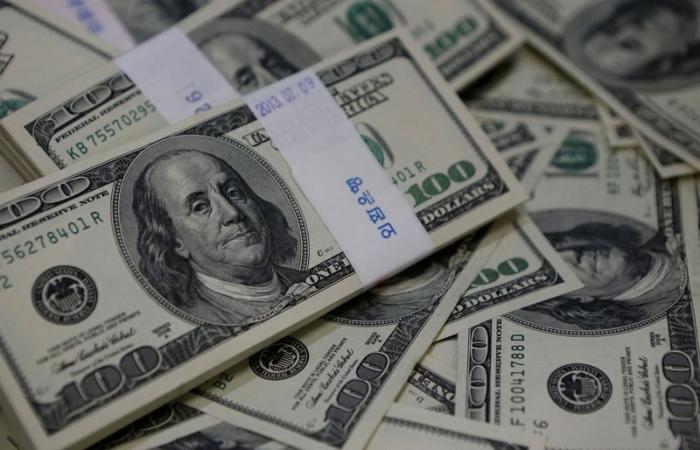Mike Dolan provides an update on the US and global markets for the day ahead.
U.S. Treasury bond yields fell Monday after Wall Street fund manager Scott Bessent was chosen to become the next Treasury secretary, with markets hoping his views on tax cuts and entitlements Customs is at least sensitive to investors’ concerns.
Ahead of Thanksgiving week, President-elect Donald Trump ended intense speculation about the Treasury secretary pick late Friday and nominated Mr. Bessent.
Although in favor of extending the 2017 tax cuts, further tax reform and deregulation, Mr. Bessent has spoken in favor of budgetary control, sees tariff threats primarily as a negotiating tool and supports the dominant reserve currency status of the dollar.
In a Wall Street Journal interview published Sunday, Mr. Bessent said the measures would include making the tax cuts from Mr. Trump’s first term permanent, as well as eliminating taxes on tips, Social Security benefits and overtime pay.
Perhaps the biggest relief for the debt markets was that his experience trading on Wall Street would influence his calibration of all these policies if the markets proved reluctant.
Although he has since abandoned the idea, Mr. Bessent recently advocated undermining the authority of Federal Reserve Chairman Jerome Powell by appointing Mr. Powell’s successor ahead of schedule and effectively creating a “shadow” Fed boss.
On Monday, yields on the 10-year and 30-year Treasury notes fell nearly 10 basis points from Friday’s close, reaching 4.32% and 4.51%, respectively, before stabilizing.
Falling yields, along with hopes for a more moderate approach to tariff hikes from the administration overall, sent the dollar lower, and stock index futures extended the rally on Friday before the bell on Monday.
The dollar index fell from a two-year high reached on Friday, while the euro regained some ground after its sharp fall late last week.
Speculation that China would remain at the center of any campaign to raise U.S. tariffs – and more nuanced universal tariff hike proposals – lifted European and Japanese stocks, while benchmark indexes mainland China and Hong Kong fell again on Monday.
Whatever happens under Trump, the pressure on China is already intense. The outgoing Joe Biden administration is expected to unveil new export restrictions to China this week, the United States Chamber of Commerce told its members.
The new regulations could add up to 200 Chinese chipmakers to a list of trade restrictions barring most U.S. suppliers from shipping goods to targeted companies, according to an email from the powerful Washington-based lobbying group.
In Europe, growing economic, trade and geopolitical concerns were underlined by the latest Ifo survey of German businesses, which showed morale fell more than expected in November.
Last week, the divergences between the Eurozone’s business surveys, which revealed a further contraction, and those of the United States, which reported a further rise, were striking.
Pressure on the European Central Bank to continue easing monetary policy is intensifying, fueling hopes of a rate cut of up to 50 basis points at the latest monetary policy meeting. the year which will be held next month.
Although ECB chief economist Philip Lane said there was still some way to go for inflation to sustainably return to target levels, he warned of the dangers of interest rates too high. tight.
“Monetary policy should not remain restrictive for too long,” Philip Lane said on Monday, according to French newspaper Les Échos. “Otherwise the economy will not grow enough and inflation will fall, I think, below target.
The pressure on European central banks was highlighted on Friday when Swiss National Bank boss Martin Schlegel raised the possibility of a return to negative interest rates if necessary.
“No one likes negative interest rates, the SNB does not like negative interest rates, but if it becomes necessary, we are ready to take the next step,” he said. declared.
In the United States, the good results of November’s rapid business surveys and the increase in long-term inflation forecasts in the latest University of Michigan household survey have pushed back forecasts of a fall in interest rates. the Fed. Only two quarter-point declines are now fully priced into futures markets for the coming year.
Wednesday’s release of October personal consumption expenditure inflation – the Fed’s preferred indicator – is the main release of the week before Thursday’s holiday.
In deals, Italian bank UniCredit fell 2% on Monday after launching a surprise 10 billion euro ($10.45 billion) bid for smaller domestic rival Banco BPM, which rose 5%. .
Commerzbank fell 6% as investors weighed the impact of the offer on Unicredit’s likely takeover of the German lender.
Shares of British broadcaster ITV jumped 9% following media reports that it could be the target of a takeover by a team led by CVC Capital Partners.
The main developments expected to steer US markets later on Monday:
* Federal Reserve Bank of Dallas November Business Survey, Federal Reserve Bank of Chicago October National Business Survey.
* Philip Lane, chief economist of the European Central Bank, and Gabriel Makhlouf, head of the Irish central bank, speak.
* Results of American companies: Agilent Technologies
* The US Treasury sells $69 billion in 2-year notes
* G7 foreign ministers meet in Fiuggi (Italy)






